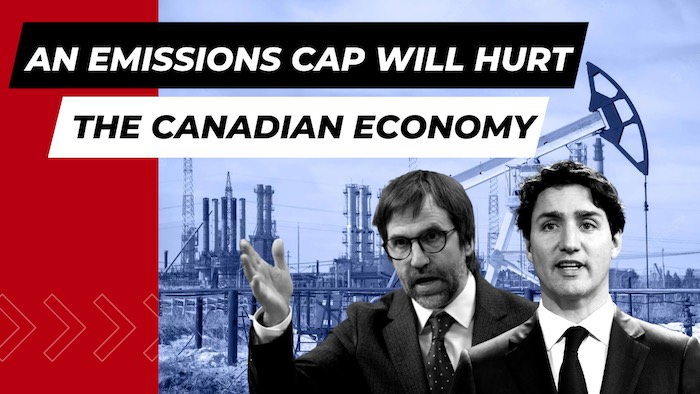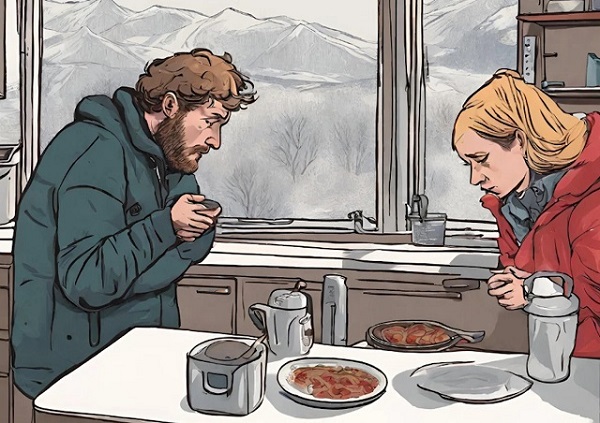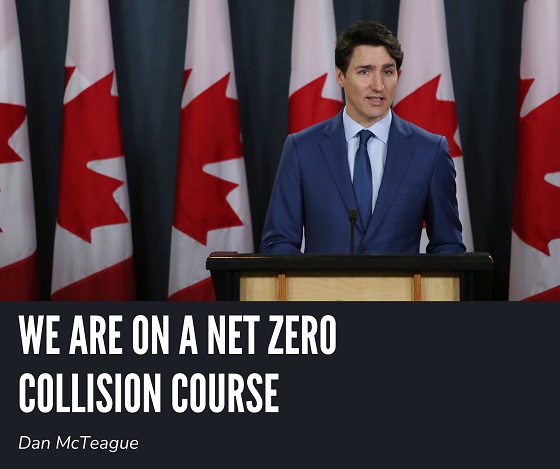Dan McTeague
Trudeau is destroying the Canadian economy one regulation at a time

It is amazing, with ever increasing energy costs in Canada and throughout the world, that Canadian Prime Minister Justin Trudeau continues to promote the extreme Green Agenda that will destroy Canada’s energy industry.
The latest example? Just the other week, the Montreal Economic Institute (MEI) released a study that describes how the Trudeau government’s proposed Emissions Cap for the energy sector would “cost the Canadian economy between $44.8 billion and $79.3 billion a year” and would “cause substantial losses, without achieving any net reduction in global emission.” You can read the study here.
In case you’ve not heard about Trudeau’s new way to destroy our economy, let me take a step back and explain.
The Trudeau government is proposing an Emissions Cap to reduce greenhouse gas (GHG) emissions in the oil and gas sector by 42 percent by 2030. This policy is another piece in their larger, foolish plan to try to achieve “Net Zero” GHG emissions by 2050. Keep in mind Canada contributes only 1.5% of global emissions, so this plan, if even achievable, would reduce only 0.45% of global emissions.
One of the options proposed to achieve this “Net Zero” craziness is a cap-and-trade system. According to Canadian Minister of Environment and Climate Change Steven Guilbeault “one of the advantages of a cap is emissions reduction certainty.”
Another certainty that Guilbeault failed to mention is that companies will think twice about investing their money in Canada.
Canadians need to consider that. The oil and gas sector is the single largest revenue provider for the Canadian government, generating $45 billion a year in annual economic activity, and contributes $170 billion a year to the GDP. The economic consequences of this plan are significant, and they will mean a dramatic drawback in social programs in this country. How are we going to pay for our hospitals, our education system? How are we going to pay for our roads and our infrastructure?
As the MEI study found, this emissions cap will result in “substantial losses without achieving any net reduction in global emissions.” Why? Because whether this government likes to admit it or not, there is an increasing global demand for oil and gas. We can either produce those resources here or get them from another country that has no environmental, much less labour standards, such as Russia, Venezuela, and Iran.
And here’s the rub. This cap on emissions would apply only to the oil and gas sector. This emissions cap would not apply to the concrete industry, the automotive industry, or the mining industry. And it certainly won’t apply to the jet building industry in Montreal. These must have better lobbyists than the oil and gas industry.
For that reason, an emissions cap, layered on top of carbon taxes, layered on top of a Clean Fuel Standard, layered on top of pipeline blockages, layered on top of Bills C-48, C-69, preventing oil from being shipped from other parts of the world — is clearly a vendetta against the sector that provides over 500,000 jobs to Canadians and contributes billions to our economy. And it is ultimately a vendetta against our pocketbooks, the interests of our society, and the Canadian way of life.
Dan McTeague
The Carbon Tax is part of a bigger plan to change the way you live

From Canadians for Affordable Energy
 Written By Dan McTeague
Written By Dan McTeague
On April 1, the carbon tax is going to rise from $65 per tonne to $80 per tonne, and it seems Canadians are noticing this jump more than those of the past few years.
Back in 2019, the Trudeau government announced its 566% carbon tax hike, starting at $15 per tonne and increasing yearly until 2030, when it would reach a staggering $170 per tonne. It received some attention at the time, but there was not a great deal of pushback. Presumably the numbers were too abstract to catch people’s attention and 2030 seemed a long way off.
But today things are different. It helps that Conservative Party leader Pierre Poilievre has been campaigning aggressively against the tax, with rallies and petitions to ‘Axe the Tax.’
Even Liberal premiers, such as Andrew Furey of Newfoundland and Labrador, have been pleading with Justin Trudeau to hit pause on the increase. In fact, a total of seven premiers in the country have spoken out against the tax, asking for a delay in its increase.
That’s because they recognize the tax is hurting Canadians. The cost of everything has gone up. It’s gotten so tough for businesses that some restaurants have begun adding a ‘carbon tax’ line item to the final bill. And if Canadians think it is bad now, wait until 2030 when the carbon tax will more than double its current rate.
The other reason people are more aware of the increase is because, well, the tax is working. It’s doing what it was designed to do, though maybe not in the way you might think. The goal is not simply to reduce emissions — in fact emissions have gone up. The goal is actually more nefarious than that. Let me explain.
The carbon tax is one of the pillars of the United Nations, World Economic Forum (WEF) Net-Zero-by 2050 agenda. In order to achieve their objective, they need all of us to fundamentally alter the way we live our daily lives. They want us to drive less, fly less, eat less meat (and more bugs). The carbon tax is a punitive means of achieving this.
In fact, the Trudeau government’s own Healthy Climate, Healthy Economy plan articulates the logic of the tax quite well when it says, “The principle is straightforward: a carbon price establishes how much businesses and households need to pay for their pollution. The higher the price, the greater the incentive to pollute less, conserve energy and invest in low-carbon solutions.”
It’s worth noting that they’re using a pretty loose definition of ‘pollution’ here, because we all know that carbon dioxide is not a pollutant — it is a gas which makes life on earth possible.
Even so, their intention is clearly stated — they figure that, if the price of fuelling up your car, going on a vacation and heating your home gets high enough, you will have to drastically alter the way you live your day-to-day life.
You will stop flying, cut back on driving, use fewer appliances. And really, you’ll just get used to having less money, until — following the slippery slope to its conclusion — you will “own nothing and be happy,” in the words of that infamous WEF tweet.
Which is to say, the carbon tax is a punishment for participating in normal economic activity, for living a regular life. Of course, for the time being you can catch a break if you live in Atlantic Canada and heat your home with oil, but if you live in the prairies and heat your home with natural gas, sorry, but you’re out of luck. You aren’t in a Liberal riding, after all!
And even then, the Liberals and their activist friends are banking on Canadians reducing their carbon emissions in order to achieve their Net Zero 2050 target.
So good for Pierre Poilievre, Andrew Furey and the other premiers for pushing back on the carbon tax.
But let’s not forget that, as noxious as it is, it’s only one small part of the Liberals’ Net Zero agenda.
Eliminating the carbon tax is merely cutting off one head of the hydra. If Canada’s political leaders are really concerned with affordability, then they need to target the monster’s heart.
It’s time that we not only axe the tax, but we need to scrap Net Zero.
Dan McTeague is President of Canadians for Affordable Energy
Dan McTeague
We are on a Net Zero collision course


Welcome to 2024 where the threat of looming power outages in a resource-rich, developed country is a reality. And we have Justin Trudeau and his ideologically-driven caucus to thank for it.
In the past month alone, Alberta has issued four emergency alerts warning consumers to reduce demand or the grid could face the risk of rotating power outages. Residents were urged in one alert to immediately limit their electrical use to essential needs only.
According to the Alberta Energy System Operator (AESO,) which manages the grid, the alert was due to sustained cold temperatures. Alberta’s grid is more vulnerable in the winter due to the decreased opportunity to generate solar power with the shorter days and of course because during extreme cold, there is usually less opportunity for wind power generation.
Thank goodness for hydrocarbons since over those days more than 80% of Alberta’s power came from natural gas and to a lesser extent, coal.
This situation in Alberta should serve as a warning for the rest of the country.
That’s because the Trudeau government is aggressively moving forward with their Clean Electricity Regulations which mandate that by 2035 the Canadian grid be zero emissions. This means the entire country will increasingly be reliant on unreliable energy sources.
And last month, the Trudeau Liberals implemented their Electric Vehicle Availability Standard, which mandates all new light-duty cars and trucks must be zero emission by 2035 as well. In other words, after 2035 forget about purchasing a new gas-powered car or diesel-driven truck. Welcome to Trudeau’s Net Zero world!
Many Canadians are wondering how we are going to produce the energy to power our cars along with everything else in our lives, especially in the depths of the cold winter months.
And the answer is simply, “we can’t.”
We are on a collision course of the Liberal government’s making. In their ideological zeal to achieve Net Zero, they seem to have been completely unhinged from reality.
As I like to remind people, Canada contributes 1.5% of global greenhouse gas (GHG) emissions. Even if we halted all use of fossil fuels in our country it would have no global effect on world CO2 levels.
We can see the consequences of this pursuit of Net Zero, in Europe. Germany has frantically put coal power back on the grid in order to meet electricity demand. The UK is slamming the breaks on EVs and stepping up North Sea oil exploration. Italy is spending billions trying to fill its energy gaps with natural gas from Libya.
We are staring down the barrel of an upcoming election and if we want to ensure our quality of life, we need a major course correction. This does not mean delaying the implementation of EV regulations, or emissions caps, or even simply pushing back Net Zero target dates.
No. We need a party that will stand up against Net Zero and its related policies. We need a government that will see that this is a suicide mission we need to abandon entirely, not simply punt down the road.
Let’s hope we don’t have to wait for the worst-case scenario before Canadians finally realize the standard of living and access to affordable energy cannot be taken for granted. We truly are on a collision course with reality, due to ideological government policies that will have a crippling effect on our economy and way of life.
Dan McTeague is President of Canadians for Affordable Energy
-

 COVID-1914 hours ago
COVID-1914 hours agoCDC Quietly Admits to Covid Policy Failures
-

 Brownstone Institute4 hours ago
Brownstone Institute4 hours agoDeborah Birx Gets Her Close-Up
-

 COVID-1917 hours ago
COVID-1917 hours agoJapanese study shows disturbing increase in cancer related deaths during the Covid pandemic
-

 Great Reset12 hours ago
Great Reset12 hours agoClimate expert warns against extreme ‘weather porn’ from alarmists pushing ‘draconian’ policies
-

 Economy2 days ago
Economy2 days agoExtreme Weather and Climate Change
-

 Bruce Dowbiggin2 days ago
Bruce Dowbiggin2 days agoWhy Are Canadian Mayors So Far Left And Out Of Touch?
-

 International2 days ago
International2 days agoTelegram founder tells Tucker Carlson that US intel agents tried to spy on user messages
-

 Business2 days ago
Business2 days agoNew capital gains hike won’t work as claimed but will harm the economy



